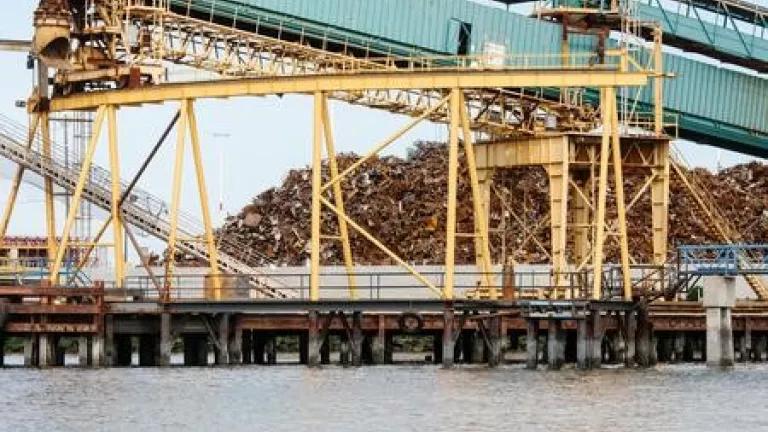Victory in California
A court rules that California must stop exempting metal shredding facilities from hazardous waste laws, clearing a path to finally protect California communities from metal shredder pollution.

Schnitzer Steel in Oakland. Photo courtesy of San Francisco Baykeeper.
Last week, in a victory for environmental justice communities around California, a court ruled that the California Department of Toxic Substances Control must finally close the loophole that allows metal shredding facilities to generate hazardous waste while skipping compliance with state hazardous waste law.
For decades, California law had a loophole for metal shredding facilities, which gave these facilities a free pass to generate hazardous waste without obeying the state’s common-sense protections to keep hazardous waste from spreading into communities. When metal recyclers shred old cars, appliances, and other products containing metal, they generate “auto fluff”: a toxic residue that can contain heavy metals like cadmium, zinc, and lead. Auto fluff is so toxic that it meets the threshold for hazardous waste under California law. But because California hasn’t required the facilities to adequately handle the fluff as hazardous waste, the facilities have been able to leave the fluff exposed to the elements. Sitting and handled in the open, this hazardous waste blows into surrounding communities, contaminating air, soil, water, and our bodies along the way. Metal shredder waste also periodically catches on fire, putting lives in immediate peril.
For years, frontline communities have been leading the fight against the toxic pollution from metal shredders. These metal shredding facilities—like Schnitzer Steel in Oakland—are a classic example of environmental racism. They are disproportionately located in communities of color and low-income communities that bear the greatest cumulative environmental burdens in the state. After years of pressure from the frontline communities most at risk from metal shredder pollution, California lawmakers began to pay attention. California passed SB 1249 in 2014, which directed the state Department of Toxic Substances Control (DTSC) to establish more protective hazardous waste management standards for metal shredding facilities. But, instead of developing those standards, or bringing metal shredding facilities into compliance with existing law, DTSC failed to implement the new law.
Communities for a Better Environment, the Center on Race, Poverty and the Environment, San Francisco Baykeeper, and NRDC filed an amicus brief in January calling on DTSC to properly regulate metal shredding facilities throughout the state. The brief, in support of a lawsuit filed by the Oakland Athletics, alleged that the state has failed to protect local communities from harmful pollution from Schnitzer Steel’s shredding facility’s pollution in Oakland, California and other facilities in the state. As we’ve previously written, NRDC and our partners felt it was important to weigh in on this case, not only for the health of the communities around Schnitzer Steel in Oakland, but for other communities near metal shredding facilities and other sources of hazardous waste throughout the state. And communities beyond California are facing similar threats, too—like in Chicago, where advocates are battling the relocation of a metal shredding operation from a well-off, largely white community to an environmental justice community.
Now, a California court has recognized that DTSC must implement the 2014 law and finally bring metal shredders in compliance with hazardous waste law. This is a victory for everyone who lives, learns, and plays near metal shredders, and a big step towards communities finally having the protection from hazardous waste that all people deserve.
Around the country, from California to Chicago's Southeast Side, communities are fighting back against pollution from metal shredders. And NRDC stands with them.




